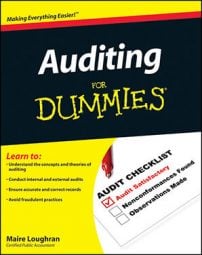At every step of an audit, you have to consider risks and their associated controls. It’s important to consider risks and controls to make sure your audit effectively and efficiently guides you toward issuing the correct audit opinion.
Although employees may have a fairly difficult time accessing investments such as stocks, notes, and bonds and converting them into cash for their personal use, the same can’t be said for cash bank accounts. Those liquid assets can be fairly easy to pilfer if proper controls aren’t in place. Therefore, your client’s cash and investment bank accounts deserve a close examination during your audit. Generally you look at two inherent risk factors: the susceptibility to theft and employee competence.
Susceptibility to theft: Cash is always considered to be inherently risky because it’s prone to theft and misappropriation. For example, an employee can misappropriate cash by purchasing personal items under the guise of the purchase being a business expense. Cash can also be misappropriated if an item is sold for cash but the sale isn’t recorded because the employee diverts it for personal use. Further, cash can be stolen by a nonemployee robbing the business, which is typically recorded as a loss rather than misappropriation.
One employee acting alone can steal a considerable amount of cash. When several employees work in collusion, the amount of theft can escalate to the point where the lack of cash flow forces the business to close. Usually, the higher the number of cash transactions, the greater the inherent risk. However, this fact fluctuates depending on controls over cash.
Employee competence: Management inexperience and incompetence plays a big part in the inherently risky nature of cash. Part of your job when assessing the risk of cash misappropriation is to get to know the type of job your client’s managers are doing.
For example, some managers don’t understand or bother to check sales adjustment transactions, such as sales returns and customer accounts being written off as uncollectible. Both types of transactions are classic cash diversion tactics. In both cases, the customer pays for the transaction, but the cash doesn’t get deposited into the corporate bank account. Instead, a dishonest employee records fraudulent sales returns or writes off the customer’s balance as uncollectible. The customer is none the wiser because she won’t be pursued for the now-nonexistent balance due.

